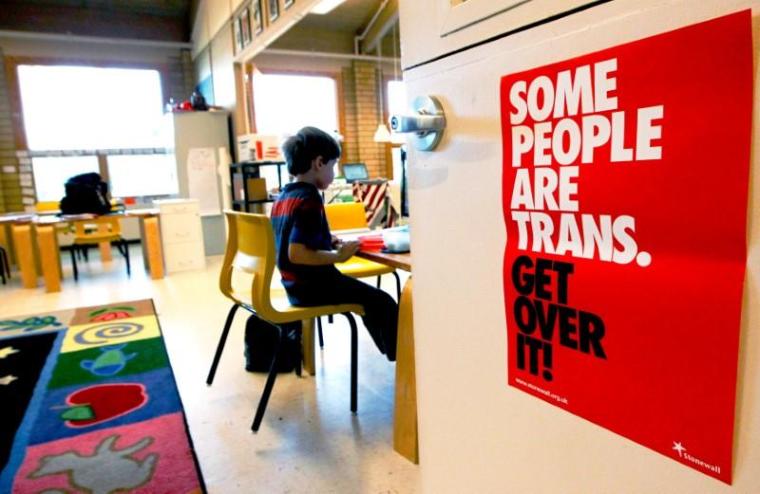Parents say child’s mental health ‘deteriorated’ after transing


Parents report that their children’s mental health deteriorated after taking steps to begin identifying as the opposite sex, according to a recent study that examined adolescents and young adults who started identifying as trans between the ages of 11 and 21.
The study, published last month in the Archives of Sexual Behavior, found that girls were more likely to socially transition than boys and that pre-existing mental health issues were common in youth who later struggled with gender dysphoria.
Northwestern University psychology professor Michael Bailey led the peer-reviewed study. Parents of Rapid-Onset Gender Dysphoria (ROGD) Kids, an organization that advocates against the “gender affirmative” model of care for children expressing a desire to identify as the opposite sex, compiled the study’s data.
According to the study, which analyzed survey data from 1,655 parents with children who identify as the opposite sex or as non-binary, found that 390 parents had visited a gender clinic or a so-called gender specialist. Among those surveyed, 51.8% said that they felt pressured to support their child’s social or medical transition, 23.6% said that they did not feel pressured, and 24.6% said that they were unsure.
Regarding mental illness, 57% responded in the affirmative when asked if their child had a history of mental health issues.
The results showed that the affirmative response was slightly higher for females (59.4%) than males (51%). The study also found that 75% of the children suffering confusion about their sex were girls, with the state of mind typically developing around age 14 for girls and 16 for boys.
Parents were more likely to say their child’s mental health deteriorated after socially transitioning, with the quality of the relationship between the parent and child also declining. The relationship before and after the transition was measured on a 6-point scale from 1 (estranged) to 6 (extremely close).
“Pre-dysphoria relationships with mothers had a mean rating of 5.2 (with 5 representing ‘fairly close’ and 6 representing ‘very close’), and relationships with fathers a mean of 4.6 (with 4 representing ‘neutral’),” the study reported.
“The change in the quality of parental relationships (from prior to gender dysphoria to after social transition) was also strongly negative, declining from an average of 4.8 (indicating ‘fairly close’) to 3.6 (between ‘neutral’ and ‘don’t get along very well’).
In addition, the results showed that the decline was more severe among mothers than fathers, decreasing by 1.5 points compared with fathers’ 0.9-point decrease.
As the study noted, there have been reports that show an increase in gender dysphoria cases among adolescent females. It further suggested that the survey is consistent with Dr. Lisa Littman’s description of Rapid Onset Gender Dysphoria (ROGD), as described in her 2018 seminal paper.
“ROGD theory proposes that common cultural beliefs, values, and preoccupations cause some adolescents (especially female adolescents) to attribute their social problems, feelings, and mental health issues to gender dysphoria,” the 2023 study reads.
“That is, youth with ROGD falsely believe that they are transgender, and that they must undergo social and medical gender transition to resolve their issues,” it continued. “A sharp increase in such false beliefs among adolescents and young adults has led to the recent ‘epidemic’ in ROGD.”
The study noted that ROGD is believed to be a “culture-bound syndrome,” citing Littman’s paper, which hypothesized that the disorder is socially contagious. If an adolescent has a friend or knows someone with ROGD, then that individual is more likely to acquire ROGD themselves.
As The Christian Post previously reported, detransitioner Chloe Cole, who was encouraged to undergo a double mastectomy as a young teenager, suffered from a variety of mental health issues around the time she began identifying as the opposite sex.
According to a lawsuit Cole formally filed against Kaiser Foundation Hospitals, the Permanente Medical Group and affiliated health professionals, these medical groups performed a “mutilating, mimicry sex change experiment” on her when she was 13. The detransitioner was also encouraged to undergo a double mastectomy and had also been prescribed opposite-sex hormones before deciding to detransition.
After her parents took Cole for medical help, the doctors allegedly told them their daughter was at risk of suicide if she did not transition.
The lawsuit accuses doctors of “experimenting” on the teenager for financial gain, emphasizing that Cole now suffers from “deep physical and emotional wounds, severe regrets, and distrust of the medical system.”
Earlier this year, Missouri Attorney General Andrew Bailey also began investigating a whistleblower’s claims about the practices at a pediatric gender clinic. Jamie Reed, a former case manager at the Washington University Transgender Center at St. Louis Children’s Hospital in Missouri, accused the clinic of lying to parents and causing harm to children.
“During my time at the Center, I personally witnessed Center healthcare providers lie to the public and to parents of patients about the treatment, or lack of treatment, and the effects of treatment provided to children at the Center,” she testified in a sworn affidavit. “I witnessed children experience shocking injuries from the medication the Center prescribed. And I saw the Center make no attempt to track adverse outcomes of patients after they left the Center.”
The whistleblower also testified that she saw doctors continue prescribing puberty blockers to children, even if their parents revoked consent, and that the doctors lied in public statements about performing gender transition surgeries on minors.
Samantha Kamman is a reporter for The Christian Post. She can be reached at: [email protected]. Follow her on Twitter: @Samantha_Kamman
Free Religious Freedom Updates
Join thousands of others to get the FREEDOM POST newsletter for free, sent twice a week from The Christian Post.




